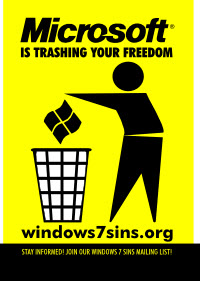FSF launches "Windows 7 Sins" campaign

With less than two months until Windows 7 hits shelves, Microsoft's latest OS is a target for a new campaign launched by the Free Software Foundation which highlights the seven sins of Windows 7.

In a letter mailed to 499 of the Fortune 500 companies (Microsoft didn't get one!) the FSF outlined how using of Windows 7 could compromise both privacy and security:
Free software is more secure because you and the wider community are independently able to read the source code of and customize any program you use in your infrastructure. It saves you from relying on a secretive third party, and the public availability of free software code means that many qualified eyeballs, the security experts and researchers around the world, are continually studying and reporting on its integrity.
The FSF doesn't try to sugar coat its message:
Like its plans to include DRM restrictions with Windows Vista, Microsoft's continued attacks against the security, privacy and freedom of your organization, are no mistake. Microsoft has a history of manipulating computer manufacturers into installing its products onto the computers you purchase.
And:
Investing in Microsoft's Windows 7 will only get you more stuck and more dependent on them.
Yowza!
While I'm not sure that I buy the whole "proprietary software is more evil than cancer" thing, the FSF do have a point about lock in and how commercial software really has become an upgrade train that's hard to get off.
I get the feeling that the message is going to fall on deaf ears though. The problem is that many companies are already locked in to Microsoft and it's easier to pay money to Microsoft (or Apple, or Adobe, or whatever company that you deal with) than to take a leap into the unknown.
Also, there are sometimes no alternatives other than to go for professional software. Applications such as Outlook or Photoshop are impossible to replace with free alternatives.
Thoughts?